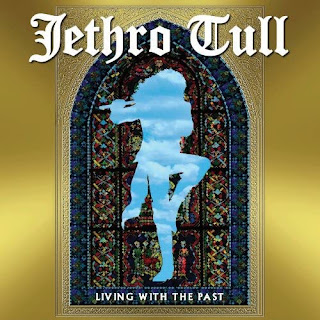V2.29
Dismissed – unfairly – by many critics during the 1970s as progressive-rock dinosaurs, the members of Jethro Tull have since had the last laugh. A new breed of music critics (your humble columnist included), raised on classic Tull albums such as Aqualung and Thick As A Brick have been more gentle in their consideration of the band’s legacy. From their first album, released in 1968, through the underrated1999 release J-Tull Dot Com, Jethro Tull has managed to put eleven Gold™ and five Platinum™ albums on the table during a nearly 35-year career. Fronted by colorful singer, songwriter and manic flautist Ian Anderson and guitarist Martin Barre, Jethro Tull has ridden out the ever-changing trends of pop culture with a unique mix of guitar-driven hard rock and British folk with threads of blues and jazz thrown into their heady musical brew.
Over the course of the band’s lengthy career, there have only been a few officially released live Jethro Tull albums, which makes Living With the Past (Fuel 2000 Records) a delight for old-school fans. Living With the Past was compiled from several live performances and television appearances, including a November 2001 concert in London’s Hammersmith Apollo. With this CD, Anderson and crew come face to face with the band’s historic past, revisiting classic and obscure songs alike. Unlike many affairs of this sort, which have the artist re-recording their biggest hits for a pittance so that some huckster can peddle them to old fan’s memories, Living With the Past plays as more of a career retrospective than as a jaded cash-grab.
Anderson is reunited with original band members Mick Abrahams, Clive Bunker, and Glenn Cornick, who join the current Tull line-up as guest performers to run through tunes like “Aqualung,” “Living In the Past” and “Jack In the Green.” The performances are charming and professional, befitting a group of master musicians in the fifth decade of their trade. A welcome addition to the band’s lengthy canon, Living In the Past closes a chapter in Jethro Tull’s history and offers a new beginning for the rock legends. A DVD release by the same name offers the complete London concert as well as interviews with band members and other special features certain to thrill old and new Tull fans alike.
Sideswipe’s sound has been described by other critics as a mix of the Indigo Girls and the Who, and there’s definitely that aspect to their songs, an inspired blending of folk roots and rock energy. The sweet harmonies of “Never Gonna Be The Same” owe a large debt to the Beatles, while several other cuts tread much the same artistic territory as ‘80s bands like the Bangles. The powerful “Make My Own Tracks” is obviously influenced by Melissa Etheridge’s folk-rock style while “Crucify Me” starts out with a Stax soul groove and pairs wonderful harmonies with Landers’ stinging six-string work. The delightful “Prisoner of War” showcases the band’s lyrical talents, falling in much the same vein as songs by the Indigo Girls or Disappear Fear. Surprisingly, material produced by Landers and Mangione for Greatest Hits shows a subtlety and deft touch lacking in songs shaped by other produces; it takes some skill for an artist to frame their material in such a proper light. Although they haven’t had many hits, and have never received the attention they deserve, Sideswipe’s Greatest Hits is a wonderful introduction to a talented band that has a bright future to explore.
Otis Taylor is, perhaps, the most unique bluesman that you’re likely to hear. Born in Chicago and raised in Denver, he learned to play guitar, banjo, and harmonica at the city’s Folklore Center. He later became part of the city’s late 1960s music scene, associating with musicians like rock guitarist Tommy Bolin. A brief residence in England yielded a failed record deal and Taylor subsequently retired from music in 1977 to pursue a successful career as a broker in antiques. As luck would have it for music lovers, noted bass player Kenny Passarelli convinced Taylor to pick up his guitar again in 1995. Since that time, Taylor’s original and highly personal sound has impacted contemporary blues music like few artists have been able to.
As shown by his latest CD release, Respect the Dead (Northern Blues Music), Taylor has a tendency to push past the barriers of traditional blues, creating a new modern sound that incorporates his rock and folk roots with Delta-inspired blues and a literate and imaginative songwriting style. Taylor fearlessly runs across lyrical turf upon which even angels fear to tread, recounting in song the lives and experiences of African-Americans in a brutally realistic and often disconcerting manner. Respect the Dead offers many such dark lyrical moments, from the racially-inspired murder of “Black Witch” to the Civil Rights struggles of “32nd Time.” Although not a household name on par with contemporaries like Keb’ Mo’ or Alvin Youngblood Hart, the enormously talented Otis Taylor is nevertheless creating timeless music, important art that reflects the history, the hopes and the fears of the artist, his family and his ancestors. (View From The Hill, June 2002)




No comments:
Post a Comment